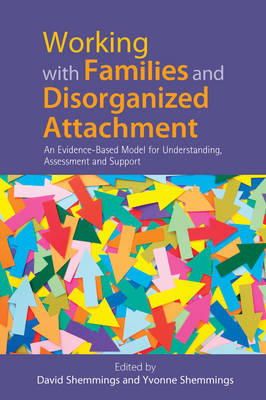
Stock image for illustration purposes only - book cover, edition or condition may vary.
Assessing Disorganized Attachment Behaviour in Children: An Evidence-Based Model for Understanding and Supporting Families
David Shemmings
FREE Delivery in Ireland
Description for Assessing Disorganized Attachment Behaviour in Children: An Evidence-Based Model for Understanding and Supporting Families
Paperback. Presenting an evidence-based model for assessing children with disorganized attachment and their adult carers, this book outlines key indicators of child maltreatment and effective interventions for child protection workers. Editor(s): Shemmings, David; Shemmings, Yvonne. Num Pages: 240 pages, black & white illustrations, black & white line drawings, black & white tables, figures. BIC Classification: JKSN; JMC. Category: (P) Professional & Vocational. Dimension: 152 x 229 x 14. Weight in Grams: 358.
Assessing Disorganized Attachment Behaviour in Children lays out an evidence-based model for working with and assessing children with disorganized attachment and their adult carers: families whose extreme, erratic and disturbing behaviour can make them perplexing and frustrating to work with.
The model is designed to identify key indicators and explanatory mechanisms of child maltreatment: disorganized attachment in the child, a parent's unresolved loss or trauma, disconnected and extremely insensitive parenting, and low parental mentalisation. The book also outlines ways of assessing children for disorganized attachment and carer capacity, and proposes interventions.
Accessible and practical, this book ... Read moreis essential reading for child protection professionals.
Show Less
Product Details
Publisher
Jessica Kingsley Publishers United Kingdom
Place of Publication
London, United Kingdom
Shipping Time
Usually ships in 5 to 9 working days
About David Shemmings
David Shemmings is Professor of Child Protection Research in the School of Social Policy, Sociology and Social Research at the University of Kent and co-Director of the university's Centre for Child Protection. He is also visiting professor of Child Protection Research at Royal Holloway College, University of London. He leads the Advanced Child Protection stream within the West London Alliance ... Read morePost-qualifying Initiative and directs the Assessment of Disorganised Attachment and Maltreatment (ADAM) Project in over 30 child protection organizations across the UK and Europe. Yvonne Shemmings is a Continuing Professional Development Specialist and has trained professionals in over 30 child protection organizations. She is a qualified social worker and was also a senior manager. Her work includes the use of attachment theory in practice. Both David and Yvonne have published widely in the fields of child and adult attachment and child protection. Their title, Understanding Disorganized Attachment, is also available from Jessica Kingsley Publishers. Show Less
Reviews for Assessing Disorganized Attachment Behaviour in Children: An Evidence-Based Model for Understanding and Supporting Families
Yvonne and David's commitment to ensuring those who work to safeguard children are given the right tools to do the very difficult job they do shines through the pages of this book. Every professional working in child protection settings should read it.
Dame Lorna Boreland-Kelly, FRSA, DBE, Strategic Advisor for Practice and Management Development, Medway Council, Kent This book ... Read moreshould be mandatory reading for all those working in child protection. It is much more than a book about attachment – what David and Yvonne Shemmings offer is a really practical way of working with children and their families. The case examples are excellent and bring the book to life.
Joanna Nicolas, Child Protection Consultant and Trainer Attachment theory provides a conceptual framework for understanding the iterative relationship patterns between child and care giver. Within a context of very rigorous training and the highest quality supervision, this book sets out how that framework can become a vital tool in helping to identify behavioural indicators of child abuse and neglect. I have huge respect for David and Yvonne and having known them both for some years now, I am always struck by their relentless commitment to getting things right for vulnerable children. This is only reinforced by their refreshing willingness here to, so openly, raise important questions of validity and effectiveness when undertaking assessments in high risk families. The application of any theory to practice must not be done lightly and conclusions drawn will have lifelong implications for children and their families. Assessing for disorganised attachment behaviours is no exception. It is because of their questioning and thoughtful approach to the complexities of child protection that I am confident to make this recommended reading for all those working in this highly charged arena. Not only does it offer an explanation of why disorganised attachment behaviours are so important to recognise, and how the ADAM project helps to do this, it also offers a wide range of practitioner case study accounts of how it works in practice. A fascinating read.
Isabelle Trowler, Chief Social Worker for Children and Families This book is written primarily for professionals working with families where there are child protection concern...Many social work practitioners will already be familiar with the work of David and Yvonne Shemmings, who developed the Assessment of Disorganised Attachment and Maltreatment (ADAM) Project and the subsequent training programmes from 2009 onward... The editors highlight the importance of professional supervision during the work... I think that this publication will appeal both to newly qualified and experienced social work professionals. It provides some valuable insight into the progress of the potential child protection risks. It is refreshing to read a publication which highlights and values the casework relationship between family members and practitioner.
Dey Wilcock, independent social worker
Seen and Heard
Show Less

